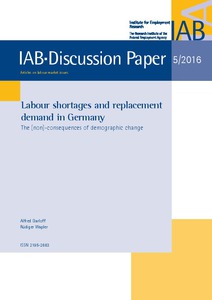Labour shortages and replacement demand in Germany. The (non)-consequences of demographic change
"Two stylised facts of the German labour market are that first, the demand for highskilled labour has been growing rapidly for a number of years and second, the country is facing a particularly strong demographic change with the expected size of the population decreasing rapidly and the average...
| Main Authors: | , |
|---|---|
| Institution: | ETUI-European Trade Union Institute |
| Format: | TEXT |
| Language: | English |
| Published: |
Nürnberg
2016
IAB |
| Subjects: | |
| Online Access: | https://www.labourline.org/KENTIKA-19106272124919244549-Labour-shortages-and-replaceme.htm |
| Summary: | "Two stylised facts of the German labour market are that first, the demand for highskilled labour has been growing rapidly for a number of years and second, the country is facing a particularly strong demographic change with the expected size of the population decreasing rapidly and the average age of the labour force increasing sharply. This has led to a widely discussed fear of 'labour shortages'. One of the reasons often stated in the public debate is that within a given time period many more old individuals are retiring than young individuals are entering the labour market. Although there is a certain logic in this argument, it is only prima facie convincing because firstly, a change in labour demand could counteract this effect and secondly, it is unclear whether - given labour demand for the occupations people retire from - people retiring from the labour market are normally 'replaced' by young cohorts entering the labour market. Thirdly, even if the size of a cohort differs between generations, it is by no means clear what the effects on labour supply are as, for example, the participation rates may also differ. We address these issues from a theoretical and empirical perspective. In the theoretical part we focus on the relationship between vacancies and unemployment (labour-market tightness) and show that it does not always increase with demographic change. In the empirical part, we analyse how employment is affected over time by different shares of different age cohorts. We find no evidence that a higher number of retirees in an occupation leads to a higher demand for younger workers. Instead, to a large extent, retirees seem to be 'replaced', if they are replaced at all, by middle-aged cohorts who change occupations. Thus, we conclude that the interaction between large retiring cohorts and small entering cohorts within occupations is less direct than is suggested in the public debate." |
|---|---|
| Physical Description: | 30 p. Digital |

